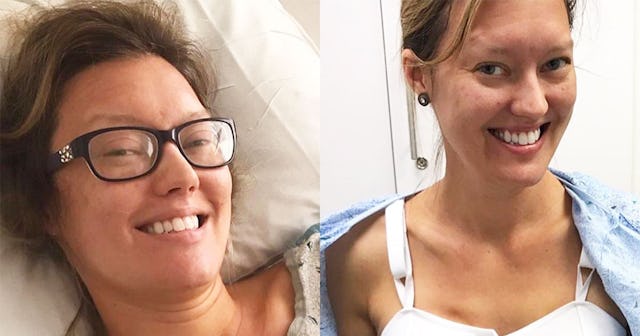Stop Putting Off Your Mammogram Because You're Not High Risk

Women, and especially moms, are notorious for putting off our routine medical appointments. We’re too busy. We don’t have time. We can’t even keep up with today, much less think about tomorrow. I get it. I have four children, and most days are a blur, a hurricane of activity. However, as a breast cancer survivor, I want you to know that cancer doesn’t wait until you’re less-busy and have more free time. Cancer shows up when it damn well pleases.
I was thirty-five years old when I found my third breast lump. The first two were benign and removed via lumpectomies. When I discovered a third lump, I assumed it was also benign. I visited my gynecologist who ordered an ultrasound and (my first) mammogram. I got the call that everything appeared normal and I should do repeat imaging in six months. However, this didn’t sit well with me. I sought a second opinion, had a breast biopsy, and then was told the news no woman ever wants to hear. I had breast cancer.
https://www.instagram.com/p/CEftMoFBTs-/?utm_source=ig_web_copy_link
Here’s the deal. I was young, five years below the typically recommended age for routine mammograms, nor did I have any outstanding breast cancer risk factors. I wasn’t overweight, rarely consumed alcohol, have never smoked, exercised multiple times a week, and ate healthy. As soon I discovered I had cancer, the doctor ran the BRCA1 and BRCA2 (breast cancer genes) test on me. Both were negative. I also had no family history of breast cancer, not even a distant relative, like a great-aunt or a second cousin. I did have one breast cancer risk factor: I’d taken the birth control pill for seven years.
You’d think, given my overall good health and the odds in my favor, I wouldn’t be the one diagnosed with breast cancer. However, that simply wasn’t the case. I became the one in eight. The reality is, one in eight women will be diagnosed with invasive breast cancer in her lifetime.
Getting your routine well-woman exam as well as a mammogram are important, because modern technology can work to find ticking time bombs in your boobs that you cannot feel or see. However, you also need to know that according to the CDC, 11% of breast cancer cases occur in women under the age of forty-five. Mammograms are typically not recommended until age forty and then every one to two years after until age seventy-five, according to the American College of Obstetricians and Gynecologists. This means that women under age forty are going to need to rely on self breast-exams.
https://www.instagram.com/p/CDT4E-BhK0Y/?utm_source=ig_web_copy_link
Monthly breast self-exams are critical to your breast health. You need to get to know your own breasts, understanding what’s normal and what’s not. You need to not only feel them, but look at them, observing any changes in appearance. If you feel or see anything funky, you need to go in and see your doctor ASAP. Do not, I repeat, do not attempt to diagnose your boob issue over the Internet. Google isn’t a doctor, and strangers in a social media group aren’t either.
So yes, get your mammogram, but don’t rely on a once-a-year test, starting after age forty, to be your sole hope and assurance. I was told, because I had dense breasts, that finding my cancer via a mammogram was like “looking for a snowflake in a snowstorm.” Even my pre-mastectomy MRI had a hard time detecting my cancer, because it was so tiny. Do your breast self-exams, every single month.
Too many times, women rely on the adage “what you don’t know won’t hurt you” when it comes to their own mental, emotional, spiritual, and yes, physical health. However, not knowing provides a false sense of security. Breast cancer doesn’t care about your income, your education status, what you have going on in your life, your race, or your age. Please listen to this survivor. Breast cancer is a lurking beast, and yes, you should absolutely take an aggressive, proactive approach when it comes to your breast health—and your health in general.
Likewise, if you find or see something suspicious on your breasts, it’s not a good idea to “wait and see.” What are you waiting for? Early detection and treatment can make a vast difference in your life and in the lives of everyone you care for.
https://www.instagram.com/p/CEhJ9Aih1rI/?utm_source=ig_web_copy_link
Please hear me. You aren’t too busy to do your monthly exams, report any problems to your doctor, and get your mammogram. Don’t tell me you’re not getting it because it’s “uncomfortable” or “awkward.” You know what’s more uncomfortable? The surgical drains that dangled from my chest for three weeks post-mastectomy. You know what’s awkward? Getting fitted for special bras that accommodate breast implants and large surgical scars and explaining to someone why you didn’t breastfeed your kids.
Cancer didn’t wait for me to get myself more organized or mentally prepared. I was a mom of four children, including an infant, when I was diagnosed. My lack of risk factors didn’t turn cancer away. I don’t know what my outcome would have been if I would have chosen to procrastinate seeing my doctor. I shudder just thinking about it.
October is Breast Cancer Awareness Month, an important reminder that we must continue to remind one another to take a proactive approach to our health. However, our breasts don’t just deserve our attention one month out of the year, when we see pink ribbons everywhere. Our breasts matter every day, of every month, of every year. Ignorance is not bliss.
This article was originally published on